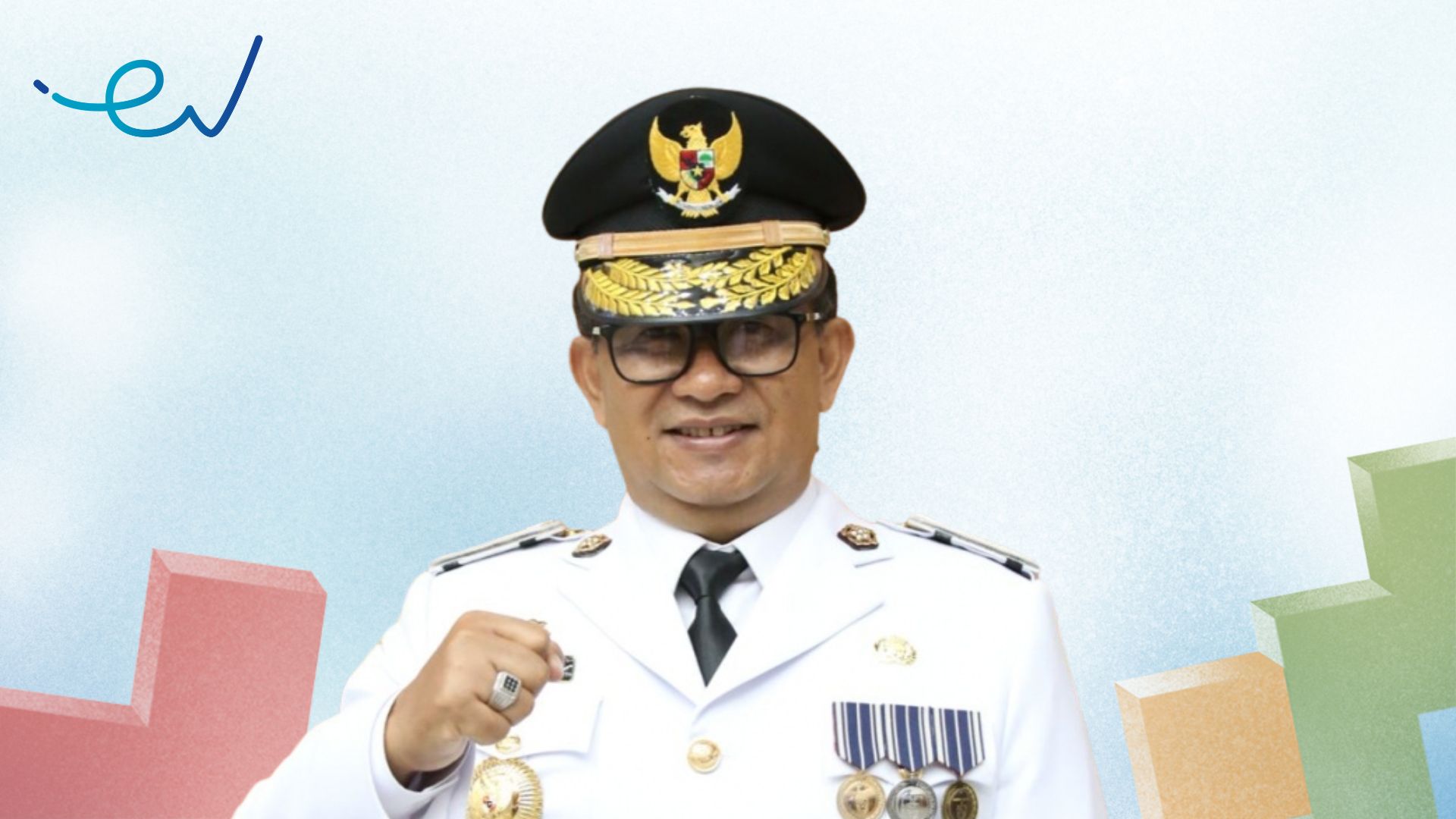What are the regional government’s programs and policies for digital entrepreneurs in order to persevere through threats and recession?
One advantage from the advancement of the digital world is access control over data. We can turn them into various information we need.
The government who responds well to economic recession is the one who is ready to face it. From the pandemic which just came to a close at the end of last year, we could learn many things, one of them is like it or not, we have to embrace digital transformation.
In West Sulawesi, we apply one quite fundamental policy in transforming data-driven government policies and this definitely cannot be separated from the digital transformation performed by the West Sulawesi Government, allowing them to be more proactive and not reactive towards the data.
For us, data acts as the best “policy intelligence device” that really helps us save time and money because in an economic situation that is not doing well, we still have to remain alert. That means we have to formulate appropriate policies, particularly in managing the funds for regional development and people’s welfare.
For us, data is the foundation for important information. That being said, we adopted a policy called “Precise Village Data” in the province of West Sulawesi. Precise data will give us accurate information and will not cause information uncertainties. Data inaccuracy can result in flawed or failed government policies. This is in line with Indonesia’s One Data (SDI) initiative through Presidential Regulation No. 39/2019 as an effort to prevent data conflicts from the village to central level. Precise village data will be able to bridge conflicts of interest and can easily be used to make predictions on a lot of situations.
“From here, we can narrow down what we have to do. This is a form of support by the government of West Sulawesi. People can claim this data. How the Government can help entrepreneurs through this data is by mapping the business projections through the right data.”
The analytics of precise village data which was truly built from scratch from the village level, by combining spatial, census and participative data can help companies figure out which aspects of their business are most likely to flourish despite uncertain global economic conditions.
With precise data, it would be very easy to make use of them to determine which products are doing well in certain markets. Companies can direct their resources to best-selling areas, their biggest market potential, and what commodities should be developed.
“Entrepreneurs, governments or regulators should take advantage of data analytics for business needs and policy-making. Harnessing data analytics tools will help governments and companies be more confident.”
From the government’s side, there are so many benefits I can share:
- Since the foundation of this precise village data is patriarchs and individuals that are mapped by name, address, and coordinates, the generated data is accurate
- The “Precise Village Data” policy can also depict the most recent conditions of the patriarchs and individuals as the subjects of development or the target subjects to be intervened
- Since this policy is utilizing the Drone Participatory Method approach (census-spatial-participative synthesis), the “Precise Village Data” policy is able to calculate the Human Development Index (IKU), SDGs, IPP, IGR, and poverty rate up to the village level
- The “Precise Village Data”-based results of IKU simplify and direct the regional government to achieving the actualization of IKU with precision, and
- Efficiency and effectivity in drafting and calculating IKU by the Regional Government
“It’s easy to understand from this point on that the government’s intervention will be more accurate, simple, effective and efficient if it is based on the correct data and information. This is the first thing to remember. If we understand the uniqueness of the problems that are happening, we can come up with the right programs. Programs that seem good on the outside may not have the same results when applied in other areas.”
“If we wish to navigate digital entrepreneurs out of recession, we have to navigate this condition (recession) by using data analytics tools.”
This is what we do. The government can adopt data-driven approaches to make important decisions. This is not limited to governments, let alone businesses. Many companies are starting to realize that data analytics tools are innovative tools. With data analytics tools, companies can review cost-cutting investment proposals and make growth-driven internal decisions. Within the government, data is an important input for making appropriate policies and interventions in the business world.
“This is the form of support we give. West Sulawesi is the first province to come up with this “Precise Village Data” policy. Please make use of this data for professional data analytics purposes to better understand internal data and connect the dots with market trends.”
“Digital entrepreneurs understand that data analysis enables companies to get closer looks at customer information, performance parameters, and so forth. Data collected from analytics tools can be utilized to analyze customer data, understand price limitations, review changing customer preferences, and effectively cut their operational costs. Companies can use data analytics tools to eliminate additional costs, focus on customer data, and increase profit projections.”
Digitalization becomes more important and inevitable. How is the regional government encouraging entrepreneurs for promoting public services, and what are the challenges?
It was already explained above that the realest form of digital transformation carried out by the West Sulawesi Government is to transform all regional development programs through accurate information and data with the “Precise Village Data” policy.
The efforts to create this digital ecosystem have to definitely be accompanied by efforts to improve digital literacy in all lines and elements of the people, not merely the lines of the government, entrepreneurs and people in general.
Efforts done by the West Sulawesi Provincial Government include: Improving digital literacy to make the digital culture flourish, optimizing the information distribution of events and tourism in West Sulawesi through social media, boosting the visibility of the keyword “West Sulawesi” on search engines so that it appears on top 3, adding e-book collections in libraries, devising digital applications and information systems in the business processes of the West Sulawesi Provincial Government, and Developing businesses through digital technology.
In addition, we also encourage MSMEs to get registered on local e-catalogues of procurement of goods and services, establishing the payment of vehicle tax via QRIS at One Roof System (SAMSAT), partnering with Bank of Indonesia to encourage MSMEs to use QRIS, adding value to economy doers by utilizing digital platforms and available marketplaces, giving training to MSMEs especially in digital marketing and e-commerce, training and developing digital talents, and directing business legalizations needed in all digital-based transactions.
The support of the central and regional governments are quintessential in the acceleration of digital adoption through holding educational programs and birthing quality digital talents, such as: digital-based transformation projects and human resources training.
On the other hand, Challenges faced: limited digital savviness of entrepreneurs and people, expensive Internet access, high intercity logistics prices, the quality of packaging and products that need to be upgraded so they can be more competitive on the digital market, and lack of people’s awareness who are not used to digital-based public services.
“This cannot be delayed and every party has to participate. Every regional organization (OPD) should also make their move. There should not be a silo mindset. We have to collaborate together for one grand purpose.”
With the massive digitalization that has been happening, what are the collaborations between the regional government and other stakeholders in encouraging entrepreneurs to adopt digital ways so far?
As I have mentioned above, we cannot do this alone. This has to be done together. There cannot only be one party who actualizes digital transformation. Every existing component needs to collaborate to realize it. One form of digital transformation is promoting the development of the digital economy. Digitalization accelerates economic recovery with fast connectivity. The challenges faced during digital transformation mentioned above should be addressed in parallel. For instance, people’s literacy problems. Digital transformation is not limited to technology and lifestyle, but also revolves around reducing gaps and accelerating balance as well as supporting faster economic recovery. The Internet has to be able to boost people’s productivity, bump MSMEs to the next level, and increase the number of MSMEs listed on e-commerce so that the Internet can provide added economic value for all people.
In order to optimize digitalization in remote areas, what kind of collaboration can hopefully be established with stakeholders, including the private sector?
We are making digitalization massive in remote areas such as West Sulawesi up to the levels of traditional markets. The simplest thing would be the use of QRIS has been introduced for transactions at traditional markets. We are working with the Bank of Indonesia for digital payment methods using barcodes which are sought after by millennials. It’s practical since you do not need to bring cash. This also applies for delivery services, and even online consultations. In Mamuju, digital payments are already rife in coffee stalls and other MSMEs, which I am also sure is the same case with all regencies in West Sulawesi.
In the economy sector, we witnessed directly the roles of banking and finance in the growth of cashless society, startups, and online transactions, as well as the transformations of physical stores into e-commerce due to the massive online transactions making use of digitalization.
To intensify this, there are some efforts we keep promoting: the compliance of entrepreneurs with the consistent use of cashless transactions, the private sector supporting socialization as well as educating people to shift to cashless transactions, and encouraging the private sector to do business processes by using more digital instruments.
“We are building people’s readiness to utilize digital technology safely, responsibly, and ethically; and creating new opportunities in the digital economy by encouraging entrepreneurship, jobs, and economic growth.”
In the 2022 EV-DCI, the Human Resources, Manpower, Regulation and Capacity of the Regional Government pillars experienced an increase. What were the regional government’s efforts to maintain the performance of these pillars?
Our effort includes: consistently doing programs which support digitalization related to Manpower and the Regulation and Capacity of the Regional Government, directing all government and public’s business processes to mostly use digital instruments, facilitating the range expansion of the digital infrastructure to all blank spot areas, and executing and supporting government and people’s digitalization development activities, especially for the development of human resources and cashless transactions.
In the 2022 EV-DCI, the Infrastructure and Economy pillars experienced a decline. What were the regional government’s efforts to improve the performance of these pillars?
Our effort includes: making a more progressive policy to help improve the performance of those pillars, facilitating the efforts in developing infrastructure and economy to stakeholders, doing optimizations on the utilization of the existing human resources.
West Sulawesi is a province that is quite active in making digital applications such as SIPEMIMPIN (for construction infrastructure purposes), Sigap Lapor (for reporting violations to the General Election Supervisory Agency), and Dasita Marasa (data and information provision). How is the process and what are the challenges faced?
The application development in the scope of West Sulawesi Provincial Government is done with the following procedure:
- OPD identifies the required services and data based on duty and function according to organizational structure
- The identification results of the data and services become the materials for devising business application processes which will be developed as needed.
- OPD submits a written request to Diskominfo by attaching the business process.
- Technical discussion with OPD and Diskominfo’s software analysts, intensely discussing application design.
- The execution of the program is carried out by Diskominfo’s programmer
- Legalization of the use of applications built by OPD.
The challenges we are experiencing are the shortage of competent human resources in drafting an application’s business process, limited duration in building the application due to urgency, the required data interoperability between applications cannot be implemented optimally, and limited supporting tools in the implementation of applications which have been built.
In the recent years, the Telecommunications and Information Accessibility Agency of the Ministry of Communication and Informatics (BAKTI Kominfo) has done several attempts in improving digital infrastructure in West Sulawesi, particularly in areas included in 3T (foremost, outermost, and left behind) such as developing free Internet access, BTS, and others. What are the impacts and challenges faced in carrying out these efforts?
Generally, the areas subjected to these programs are positively influenced, especially for people living nearby where digital infrastructure is installed due to the central and regional governments’ programs. Such as simplifying communication among people living in remote and blank spot areas, easing people in accessing outside information and knowledge swiftly, people will easily promote the village’s potentials from various aspects: tourism, creative economy, and culture, making it easy for people to do online transactions to fulfill their needs, and increasing the government’s objective in reducing blank spot areas, particularly in remote villages.
Meanwhile, the challenges we face are: geographical conditions with challenging land contours hinder tool installation processes which also results in limitations of emitted signals, land availability for the construction of network equipment which can be long and intricate, potentially limited customers which can result in investment difficulties regarding network development, user commitment towards continuity of services, especially in regards to payment, and jealousy between regions, particularly blank spot areas, since the construction of digital infrastructure is not evenly carried out in all areas.
Sustainable development is an important aspect of providing access to development that is fair and inclusive, as well as protecting the environment. What are the efforts of the regional government in encouraging a digital economy which is aligned with sustainable development goals?
“Data-Driven Policy Making”. When it comes to the corporate sector, we can better understand how various data-driven approaches are now being applied to increase profit, including systems to amplify performance and skills, evaluate campaigns’ performance, and determine optimum prices.
I will share the successful story of the New York City Police Department (NYPD) in the mid 1990’s when they applied a computerized system called CompStat, to track and map crime based on boroughs, enabling them to better use their resources. This system, which has been replicated by other cities, made the homicide rate in the city subside by almost 70%, far better than the national rate.
Now, in West Sulawesi, we emphasized “Precise Village Data”. By making use of this technology more effectively, we can start closing the gap of data discrepancy that has long hindered effective policy-making. When the problem is highlighted, policy-making can be more accurate, with resources being directed accurately and efficiently; more adjusted, so that responses can cater to different needs; everything becomes more agile and adaptable to changes. Building a government that is data-driven will need continuous leadership and investments. But, it is what we are committed to do.
The province of West Sulawesi consists of 6 regencies, 69 districts, 74 sub-districts, and 576 villages. The population is predicted to reach 1,5 million with a total area of 16,787.18 km². The “Precise Village Data” policy is still ongoing until every village is covered. However, just from the existing data, the new technology for data collection, analysis, and distribution opens new doors to make the invisible visible, the intangible tangible, and the complex become manageable.
The lack of reliable data causes decision-making that is based on intuitions, past experiences or expertise which have serious flaws and may result in biased policies.
Through this policy, we as decision-makers are truly assisted with priority scaling. This data enables us to swiftly identify a series of problems that need to be tackled. However, due to resource limitations, we have to come up with a priority list based on the relative urgency rate to allocate attention and resources efficiently and evenly.
It is not new to say that the government’s ideas have to be based on data, evidence, and rational analysis, but it is indeed the right method. What is new is opportunities created by information technology to crystalize this problem and highlight effective solutions through the “Precise Village Data” policy. Integrating these 208 parameters into one coherent entity is very important to implement data-driven policy making.
It has to be acknowledged that the absence of reliable, accessible, and updated data can be challenging, especially for developing countries. Oftentimes, the lack of capacity, resources, safety and environmental conditions hinders data collection and analysis for sustainable development. This is what we are trying to avoid in West Sulawesi.
Download the EV-DCI 2023 here.







